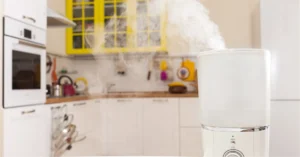Yes, breathing ionized air is safe for most individuals. Breathing clean and fresh air is essential for our overall well-being.
With advancements in technology, ionizers have become popular for improving indoor air quality. These devices release negatively charged ions into the air, which are believed to attach to positively charged particles like dust and allergens, making them heavier and causing them to settle out of the air.
This can potentially reduce the amount of airborne particles that we breathe in. However, it is important to note that for individuals with respiratory conditions, such as asthma or allergies, it is advisable to consult a healthcare professional before using ionizers, as they may cause irritation or exacerbate symptoms in some cases. Overall, ionized air can provide a fresh and clean environment, but it is important to use with caution and consider individual health needs.
Weighing The Risks
In today’s modern world, many people are constantly looking for ways to improve their health and well-being. One popular trend that has emerged is the use of ionized air purifiers. These devices claim to not only remove harmful particles from the air, but also provide numerous health benefits. However, it is important to weigh the potential risks and side effects associated with ionized air before incorporating it into your daily life.
One major concern regarding ionized air is the emission of ozone. Ozone is a gas that can be harmful to our respiratory system when inhaled in large quantities. It can cause a variety of health issues such as chest pain, coughing, shortness of breath, and throat irritation. While ionized air purifiers are designed to release a minimal amount of ozone, it is still important to be cautious, especially for individuals with respiratory conditions or allergies.
Furthermore, studies have shown that exposure to high levels of ozone may have long-term effects on our health, including increased risk of respiratory diseases and cardiovascular problems. Therefore, it is crucial to carefully consider the potential risks and consult with a healthcare professional before using an ionized air purifier.
Navigating The Market
With the increasing popularity of ionized air purifiers, it is important to understand the market and choose the right product for optimal safety. There are different types of ionizers available, each with their own unique features. Some utilize negative ions, while others employ UV light or photocatalytic oxidation to purify the air. It is crucial to do thorough research and read reviews to ensure you select a reputable and reliable ionizer.
When it comes to features, consider the coverage area, filter replacement frequency, noise level, and ease of use. Look for models with adjustable ion output and fan speed controls to customize your air purification needs. Additionally, pay attention to certifications such as Energy Star and AHAM to ensure the ionizer meets industry standards.
In conclusion, when navigating the market for ionizers, take the time to explore and compare different types of ionizers, as well as their features and certifications. By following these tips, you can make an informed decision and choose an ionizer that provides clean and safe ionized air for you and your family.
The Empirical Evidence
Empirical evidence from scientific research suggests that breathing ionized air is generally safe and can have beneficial effects on respiratory health. Studies analyzing the safety and effectiveness of ionized air have shown promising results.
One area of research focuses on air ionizers, which are devices that produce negative ions to improve air quality. These devices have been found to reduce airborne particles and allergens, such as pollen and dust, which can be beneficial for individuals with respiratory conditions like asthma and allergies.
Furthermore, research has indicated that breathing in negative ions may have a positive impact on mood and mental well-being. Negative ions have been associated with increased levels of serotonin, a chemical that affects mood and stress levels.
It is essential to note that while the scientific evidence supports the safety and potential benefits of ionized air, individual experiences may vary. Some people may be more sensitive to negative ions and may experience mild side effects like headaches or dizziness. However, these occurrences are relatively rare and usually short-lived.
Considering the empirical evidence, it appears that breathing ionized air carries minimal risks and has the potential to improve respiratory health and overall well-being. It is worth exploring the use of air ionizers as a safe and effective way to enhance the quality of the air we breathe.
Unveiling The Benefits
Is it safe to breathe ionized air? Let’s unveil its benefits. Breathing ionized air has potential health benefits. Firstly, it helps to improve air quality by removing harmful particles and allergens, providing clean and fresh air. This can be particularly beneficial for individuals with respiratory conditions such as asthma or allergies. Secondly, ionized air can promote relaxation and reduce stress. Negative ions have been linked to increased serotonin levels, which can enhance mood and overall well-being. Furthermore, ionized air may improve sleep quality by creating a more peaceful and calming environment. Debunking common myths and misconceptions, ionized air does not pose any harm if the recommended levels are maintained. With its numerous benefits, breathing ionized air can be a safe and beneficial practice for many individuals.
Precautions To Consider
An ionizer, which is designed to purify the air by emitting negative ions, is often used to improve indoor air quality. However, it is important to take a few precautions to ensure the safety of breathing ionized air.
Firstly, proper ventilation is crucial when using an ionizer. It is recommended to open windows and allow fresh air to circulate regularly to prevent any potential buildup of ionized particles.
Secondly, maintenance plays a significant role in ensuring safe use of an ionizer. Regular cleaning and replacing of filters are imperative to prevent the accumulation of dust and other particles. This will promote proper functioning and avoid any potential negative health effects.
Lastly, it is essential to follow the manufacturer’s guidelines for safe and effective use of an ionizer. These guidelines may include recommended room sizes, suggested placement, and operating duration. Adhering to these instructions will help maximize the benefits of ionized air while minimizing any risks associated with its use.
Final Verdict: Is It Safe?
In evaluating the safety of breathing ionized air, it is crucial to consider the key takeaways and findings that have emerged from numerous studies and research. The use of ionizers or air purifiers that emit negative ions has been shown to have certain benefits. Negative ions can help improve air quality by removing allergens, pollutants, and odors, creating a fresher and cleaner environment. Furthermore, they may contribute to enhanced mood and overall well-being.
However, some potential concerns have also been identified. For individuals with certain respiratory conditions, such as asthma, inhalation of high concentrations of negative ions may trigger symptoms. Additionally, the presence of ozone, which can be produced as a byproduct of ionization, might cause respiratory irritation in some individuals.
Ultimately, it is essential to strike a balance between the advantages and potential risks associated with breathing ionized air. It’s advisable to consult with healthcare professionals, especially for those with respiratory conditions, to determine whether using ionizers or air purifiers is suitable for their specific needs.
Ionized Air: Friend Or Foe?
Ionized air: a term that has gained significant popularity in recent years. With claims of numerous health benefits, it is no wonder that people are drawn to the idea of breathing in ionized air. But is it truly safe?
Ionized air refers to air that has been charged with negative ions. These negatively charged particles are believed to have a positive impact on our overall well-being. Proponents of ionized air argue that it can help improve mood, boost energy levels, and even enhance cognitive function.
However, there are differing opinions when it comes to the safety of breathing ionized air. Some experts suggest that excessive exposure to negative ions can lead to lung irritation or even respiratory problems. They argue that while negative ions may have certain benefits, caution should be exercised when it comes to prolonged and excessive inhalation.
Ultimately, the safety of breathing ionized air remains a subject of debate. As with any health-related topic, it is important to consult with professionals and consider the individual needs and circumstances before making any decisions.

Credit: www.healthline.com
The Science Behind Ionization
Ionized air has gained popularity for its potential benefits to air quality. The process of ionization involves the generation of negative ions, which have a significant impact on the surrounding environment. These negative ions are produced through various methods, such as through natural processes like lightning or through artificial ionizers.
When these negative ions are released into the air, they attach themselves to airborne particles like dust, pollen, and pollutants. This causes the particles to become heavier and fall to the ground, effectively removing them from the air we breathe. The result is cleaner and fresher air with reduced levels of airborne contaminants.
Besides their ability to cleanse the air, negative ions are also believed to have other positive effects on our well-being. Some studies suggest that they may help improve mood, increase alertness, and reduce stress levels. However, it is important to note that while ionization has potential benefits, further research is needed to fully understand its long-term effects on human health.
Frequently Asked Questions For Is It Safe To Breathe Ionized Air
Is It Safe To Be In A Room With An Ionizer?
Yes, it is generally safe to be in a room with an ionizer. Ionizers help clean the air by removing impurities, but some models may produce small amounts of ozone. It’s best to follow the manufacturer’s instructions and maintain proper ventilation in the room.
Is It Healthy To Breathe Ionized Air?
Breathing ionized air may have health benefits. It can help to neutralize harmful particles in the air, reducing allergies and respiratory issues. However, it is important to ensure that ionized air is not overused, as excessive exposure may have negative effects.
What Are The Side Effects Of Breathing Ionized Air?
Yes, it is generally safe to be in a room with an ionizer. Ionizers help clean the air by removing impurities, but some models may produce small amounts of ozone. It’s best to follow the manufacturer’s instructions and maintain proper ventilation in the room.
Conclusion
Breathing ionized air can have both positive and negative impacts on our health. While it may provide benefits such as improved respiratory function and mental clarity, it is crucial to consider the potential risks associated with long-term exposure. It is advisable to consult with experts and conduct thorough research before incorporating ionization techniques into your living space.
Ultimately, striking a balance between fresh air and ionized air is key to maintaining a safe and healthy environment.




